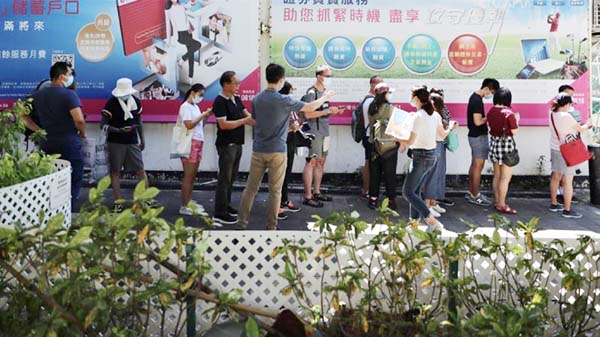
Al Jazeera News :
Hong Kong’s opposition camp has set up polling booths across the Chinese-ruled city for primary elections aimed at selecting pro-democracy candidates to run in the Legislative Council elections in September.
Saturday’s primaries came less than two weeks after Beijing imposed sweeping national security legislation on the Asian financial hub, stoking concerns that wide-ranging freedoms not seen in mainland China will be crushed.
The law punishes what China describes broadly as secession, subversion, “terrorism” and collusion with foreign forces, with up to life in prison and allows mainland security agents to operate officially in Hong Kong for the first time.
“The primary election is our first time to let Beijing know Hong Kongers never bow down to China,” pro-democracy activist Joshua Wong said.
Gwyneth Ho, an independent pro-democracy candidate, said she will run for elections despite the fact that she had concerns about her future.
“Even though we are concerned we also know that if we do not do something, if we do not resist the authoritarian rule there is no future for us to be concerned about,” she told Al Jazeera from Hong Kong.
On Saturday morning, Hong Kong police raided the office of a prominent opinion pollster that was helping the city’s pro-democracy opposition to conduct the primary election.
Robert Chung, the president of Public Opinion Research Institute (PORI), an independent pollster that regularly conducts surveys on public opinion, said officers copied files from computers, monitored by PORI’s lawyer, but did not remove the machines.
Police claimed they were responding to a report that PORI computers had been hacked, resulting in an unlawful leak of personal information.
Chung said he got a “verbal promise” from the police that they would not use information unrelated to the suspected leak.
Al Jazeera’s Divya Gopalan, reporting from Hong Kong, said the polling, which was supposed to start at noon (04:00 GMT), was delayed by a few hours after the police raid on PORI.
“There are many questions from the democratic camp over the time of this raid as it took place on the first day of the primaries,” Gopalan said.
While the primaries are only for the opposition camp, observers are watching closely as they say the turnout at the election will serve as a litmus test of a broader opposition to the national security law.
The election seeks to bolster the chance for democracy candidates to achieve a 35-plus majority in the 70-seat legislature in polls on September 6, potentially giving them the power to block government proposals.
Hong Kong’s opposition camp secured a landslide victory in district council elections in November, riding on support for an anti-government protest movement triggered by a now-withdrawn bill that would have allowed people to be sent to mainland China for trial.
Protests that escalated in June last year and evolved into calls for greater democracy have fizzled since police arrested more than 300 people on July 1, the day after Beijing introduced the national security law.

